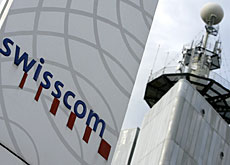Swisscom follows EU lead to cut roaming fee

The cost of mobile phone calls outside Switzerland is to sink after the country’s dominant operator, Swisscom, announced on Monday it was slashing roaming charges.
The company could lose at least SFr50 million ($30.4 million) in revenues next year in response to new European Union rules. One of Switzerland’s other big mobile providers, Sunrise, has already followed suit.
Swisscom is not bound by EU law because Switzerland is not an EU member but reacted as European competitors began to cut fees in response to the new regulations from Brussels.
The company said that the price reduction was a result of successfully negotiated lower fees with other European mobile phone operators, a process that is continuing.
The Swiss price regulator welcomed the company’s decision to reduce roaming fees within Europe to 85 cents ($0.70) a minute (including tax) for outgoing calls from September 22. Swisscom Mobile subscribers currently pay SFr1.50 per minute and pre-paid customers SFr2.
Roaming tariffs are attracted when people use their mobile telephones abroad as the operator in that country charges a fee to use its network that is then passed on to the customer.
EU regulations that came into force at the end of June capped these fees to €0.49 (SFr0.81) for outgoing calls and €0.24 (SFr0.40) for incoming – excluding value added tax (VAT). These maximum tariffs are expected to be lowered further in the next two years.
Positive news
“Compared with the rest of Europe, Swisscom’s new rates will therefore be extremely competitive,” Swisscom said in a statement.
Incoming calls will be charged 40 cents as compared with the current rate of between 60 and 80 cents, and the same fee will apply for SMS messages.
Swisscom defended its decision to start charging a full 60 seconds for each fraction of a minute that customers use their phones as being in line with competitors. Previously, this applied to only the first minute followed by blocks of 30 seconds thereafter.
Price regulator Rudolf Strahm said the “positive” price reduction was the result of political pressure and the threat of regulation, and called on other operators to follow Swisscom’s lead.
Sunrise said it will reduce tariffs once negotiations with international partners are concluded, while Orange said it was monitoring the situation. Tele2, a smaller operator, said it would also cut its rates.
Professor Matthias Finger, a telecoms expert at the Federal Institute of Technology in Lausanne, told swissinfo that Swisscom stood to gain ground on its competitors despite losing revenue.
No adverse effect
“Swisscom may lose revenues, but it looks good to their customers if they are the first to announce tariff cuts,” he said.
“Sunrise and Orange cannot maintain their position for too long or they will lose customers. However, I cannot see this development affecting the distribution of market share within Switzerland.
“The expectation is that everyone will have to go through this process and that roaming fees will be harmonised across the board.”
Swisscom added that its earlier 2007 full-year SFr11.2-SFr11.3 billion turnover and SFr4.4-SFr4.5 billion earnings before interest, tax, depreciation and amortisation (Ebitda) forecast took the changes into account.
swissinfo, Matthew Allen with agencies
Swisscom first-half 2007 figures:
Turnover: SFr5.094 billion (+6.7% compared with previous year)
Ebit: SFr1.228 billion (+10.6%)
Net income: SFr936 million(+23.5%)
Employees at June 30: 20,498 (+22.5%)
The Swiss government has a 54.81% stake in Swisscom.
The company has said its total number of fixed, broadband and mobile customers hit the ten million mark for the first time, in addition to 1.2 million customers acquired with the purchase of Italian company Fastweb.
The EU’s governing body, the European Commission, started to look into “unfair and excessive” roaming fees in July last year. It estimated that roaming mobile phone charges netted operators around €8.5 billion (SFr14 billion a year).
Its antitrust authority had started investigating Britain’s Vodafone and T-Mobile of Germany in 2004 and 2005 for charging excessive fees. These investigations were dropped in July as both groups vowed to cut costs.
The EC threatened to slash roaming fees altogether in May. A European parliamentary committee had one month earlier recommended a cap of €0.40 (SFr66) a minute for outgoing calls and €0.15 for incoming.
The initiative stalled in the spring as opinion amongst member states was split as to how far to regulate the fees. However, agreement was reached and the new regulation came into force on June 30 this year. Before then, the average cost of roaming charges was put at €1 (SFr1.65) a minute for outgoing calls.

In compliance with the JTI standards
More: SWI swissinfo.ch certified by the Journalism Trust Initiative




You can find an overview of ongoing debates with our journalists here. Please join us!
If you want to start a conversation about a topic raised in this article or want to report factual errors, email us at english@swissinfo.ch.